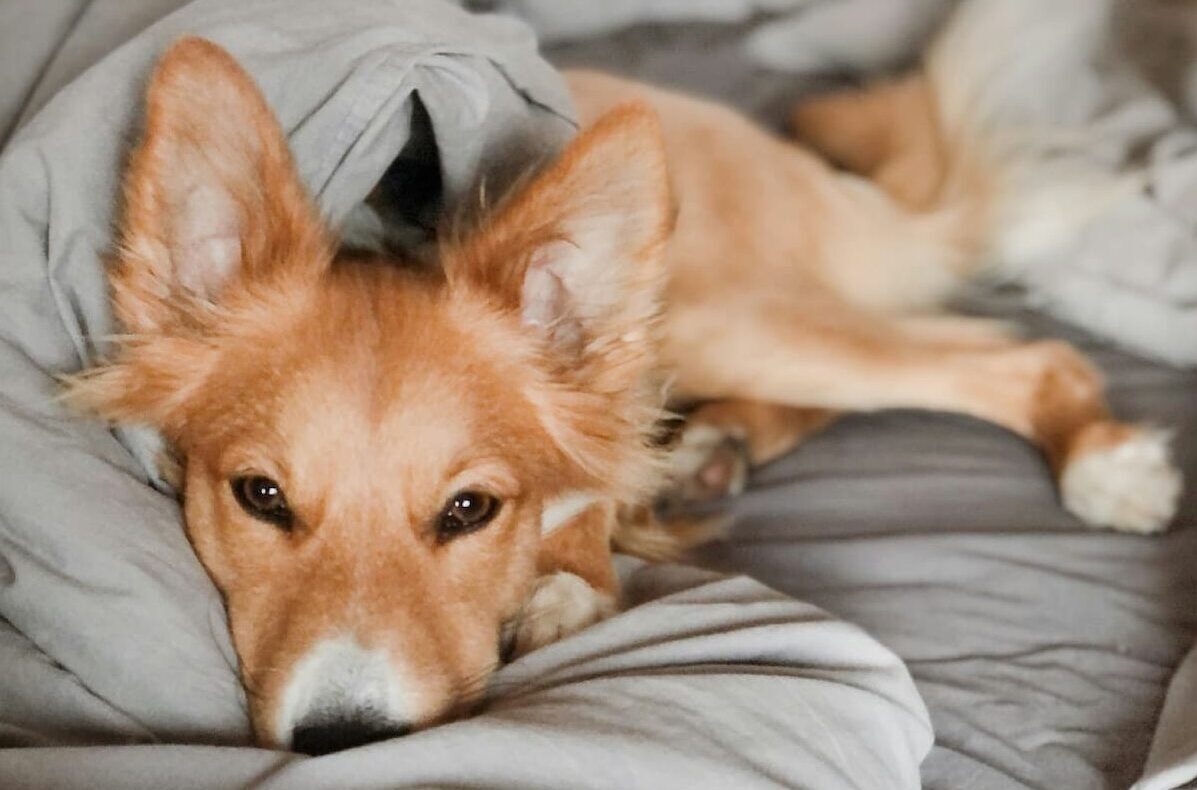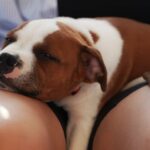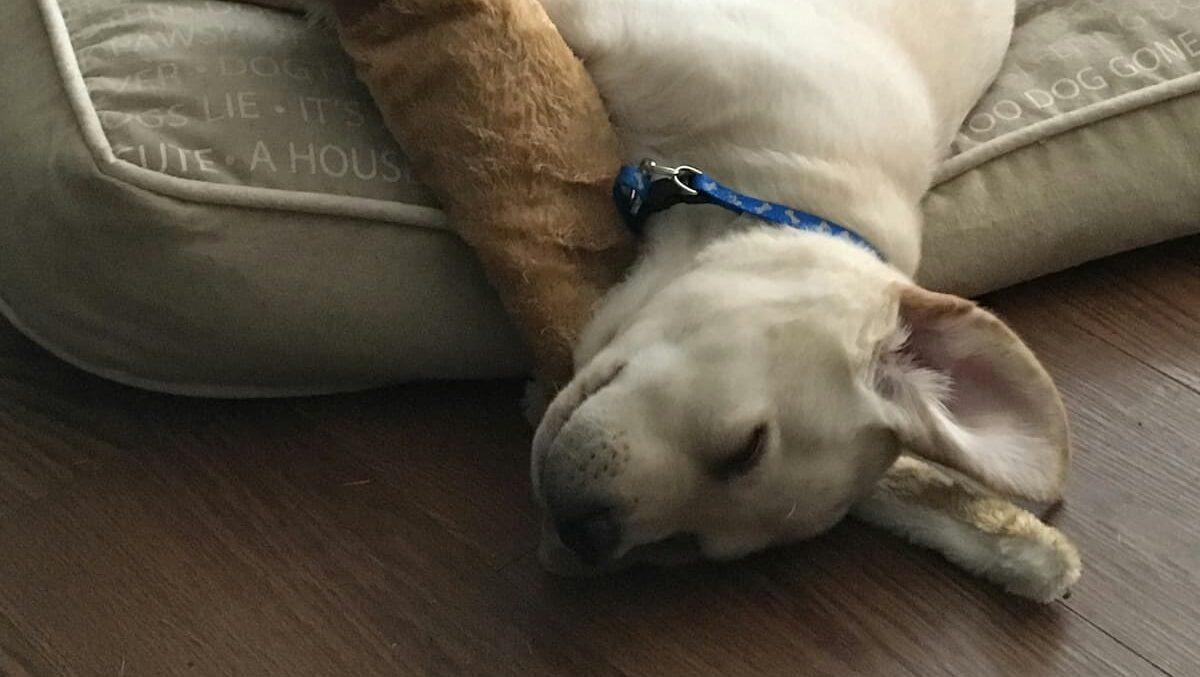Picture this: You come home after a long day at work, excited to relax on your comfy couch.
But as soon as you step into the living room, your heart sinks.
There it is, a pile of shredded fabric and foam scattered across the floor.
Your dog, with those innocent eyes, greets you wagging its tail, as if nothing happened.
How many times has this happened to you?
If you’re anything like me, you’ve probably lost count.
So, why on earth do our beloved canine companions seem to have an unyielding desire to demolish their beds?
Read on to find out.
Why Do Dogs Chew Up Their Beds?
Dogs and their affinity for chewed up beds seem to go hand in paw.
Whether it’s a fluffy pillow or a lavish mattress, they just can’t resist sinking their teeth into them.
But what lies behind this mystery?
Let’s delve into the fascinating world of our furry friends and uncover the motivations that drive them to bed destruction.
1. Boredom Buster: Our four-legged pals are full of energy, and when they don’t have an outlet to release it, their mischievous side comes to play.
Chewing can be an entertaining and stimulating activity for them, especially when they’re left alone for long periods.
Beds, with their soft textures and enticing stuffing, become the perfect target for their need to vent and keep themselves occupied.
So, if you find your pup’s bed in tatters, it might be a sign that they’ve been feeling a tad bit bored.
2. Teething Troubles: Just like human babies, puppies go through teething as well.
The discomfort and itchiness of their growing teeth can compel them to chomp on anything within reach, including their beloved beds.
For puppies, the act of chewing helps alleviate the pain and soothe their gums.
It’s their way of exploring their new set of pearly whites and finding relief in the process.
So, if your little bundle of joy is going through the teething phase, it’s no wonder their bed becomes a casualty.
3. Separation Anxiety: Dogs are social beings who thrive on human company.
When left alone, some pups may experience separation anxiety, which can manifest in various ways, including destructive behavior.
Chewing on beds could be their attempt to cope with the anxiety and stress of being apart from their beloved humans.
The familiar scent and presence of their bed provide comfort and reassurance in your absence.
Hence, the act of chewing becomes a form of self-soothing for them.
Practical Tips to Prevent or Minimize Bed-Chewing
Does your furry friend have a habit of turning their cozy bed into a pile of shredded fluff?
You’re not alone!
Many dog owners have faced this frustrating issue, wondering why their beloved pets engage in such destructive behavior.
Here are some effective solutions to help prevent or minimize bed-chewing in your canine companion:
1. Provide Appropriate Chew Toys
Dogs have an inherent need to chew, and by offering suitable chew toys, you can redirect their chewing instinct away from their bed.
Opt for sturdy toys made from rubber or nylon that are specifically designed for aggressive chewers.
Consider toys with different textures and shapes to keep your dog engaged and entertained.
2. Increase Exercise and Mental Stimulation
Boredom can be a significant contributor to destructive chewing.
Make sure your dog gets plenty of physical exercise through walks, runs, or playtime.
Mental stimulation is just as important, so mix up their routine with puzzle toys or interactive games that challenge their problem-solving skills.
A tired and mentally stimulated pup is less likely to resort to bed-chewing out of sheer boredom!
Keep things exciting and fresh by rotating your dog’s toys and activities regularly.
This helps prevent boredom and ensures they always have something new and interesting to explore.
3. Create a Safe and Comfortable Environment
Consider the type of bed you provide for your pet.
Opt for durable materials like tough canvas, heavy-duty nylon, or even elevated beds to discourage your dog from destroying it.
Additionally, ensure your dog has a designated, comfortable space of their own where they can relax and feel secure.
Providing enough toys, including a special “chew-only” toy, can also make their living space more engaging, reducing the temptation to chew their bed.
FAQ
Q: What drives dogs to chew up their beds?
A: Dogs, being the curious creatures they are, have a few reasons behind this affectionate act of bed demolition.
Firstly, it’s important to acknowledge that chewing is a natural behavior for our furry companions.
Puppies explore the world with their mouths, much like how we humans use our hands.
Chewing allows them to satisfy their teething tendencies, ease discomfort, and alleviate any boredom or frustration they may be feeling.
Q: Is there anything else that plays a role in their destructive behavior?
A: Absolutely!
Another factor that might contribute to your dog’s chew-happy habits is the need for reassurance and comfort.
Dogs can sometimes chew on their beds as a self-soothing mechanism.
Just like how we might fiddle with a pen or squeeze a stress ball when we’re feeling anxious or uneasy, dogs do the same, but with their teeth!
Chewing provides a sense of security and calmness, similar to how a warm hug or cuddling up under a cozy blanket makes us feel better.
Q: Does the bed itself make a difference?
A: That’s a great point!
The type of bed your dog has can indeed impact their propensity to chew it up.
Some dogs may prefer a softer and fluffier bed, while others might opt for something more durable and chew-resistant.
If your pooch repeatedly destroys their beds, try experimenting with different materials and designs to find the right match.
Remember, dogs have their own unique preferences!
Q: How can we redirect this behavior and save their beds?
A: Ah, the golden question!
Redirecting your dog’s destructive chewing habits can be a savior for both your sanity and their beloved bed.
Providing appropriate chew toys and bones can redirect their attention from the bed to something designated for chewing.
Additionally, engaging your pup in regular physical exercise, playtime, and mental stimulation will help alleviate boredom and reduce their destructive tendencies.
Q: What if the problem persists despite trying different solutions?
A: If your furry friend persistently devours their beds despite all your efforts, it might be worthwhile to consult with a veterinarian or a dog behaviorist.
They could provide further insight into understanding the underlying reasons and offer tailored solutions.
Remember, each dog is unique, and sometimes professional guidance is the best route to address this behavior.
Q: Any final thoughts on why dogs chew up their beds?
A: Absolutely!
While we may find our dog’s bed-chewing antics frustrating, it’s crucial to approach the situation with empathy and understanding.
Dogs communicate through their behavior, and this is their way of expressing their needs and emotions.
By actively addressing their teething, anxiety, and boredom, we can create a happier, healthier environment for our four-legged friends—and hopefully save a few beds along the way!
So, the next time your pup decides to reduce their cozy bed to mere shreds, remember: there’s a reason behind the chaos, and together, we can find a solution that satisfies both your dog’s needs and your desire to keep a decent-looking bed!
Closing the Chapter
From the intrinsic need to mark their territory to their eternal quest for comfort, our furry friends have quite the repertoire of reasons behind this seemingly destructive behavior.
As much as we may grumble and sigh when we find our fluffy companions gnawing on their once pristine bed, it’s important to remember that chewing is a natural instinct for dogs.
They’re not out to annoy us or spitefully destroy their own belongings.
Instead, they’re driven by primal instincts and undeniable physiological factors.
It’s worth noting that dogs can chew up their beds due to anxiety or boredom, seeking solace in the act of gnawing.
Providing them with plenty of physical exercise, mental stimulation, and a safe and comfortable environment is key to preventing destructive behaviors.
Remember, folks, patience is key when training our furry companions.
Understanding their instincts and addressing their needs will go a long way in fostering a harmonious relationship.
And if you’ve recently fallen victim to a doggie demolition project, take a deep breath, remind yourself of the love and joy your canine buddy brings you, and maybe consider investing in a more durable dog bed next time!












